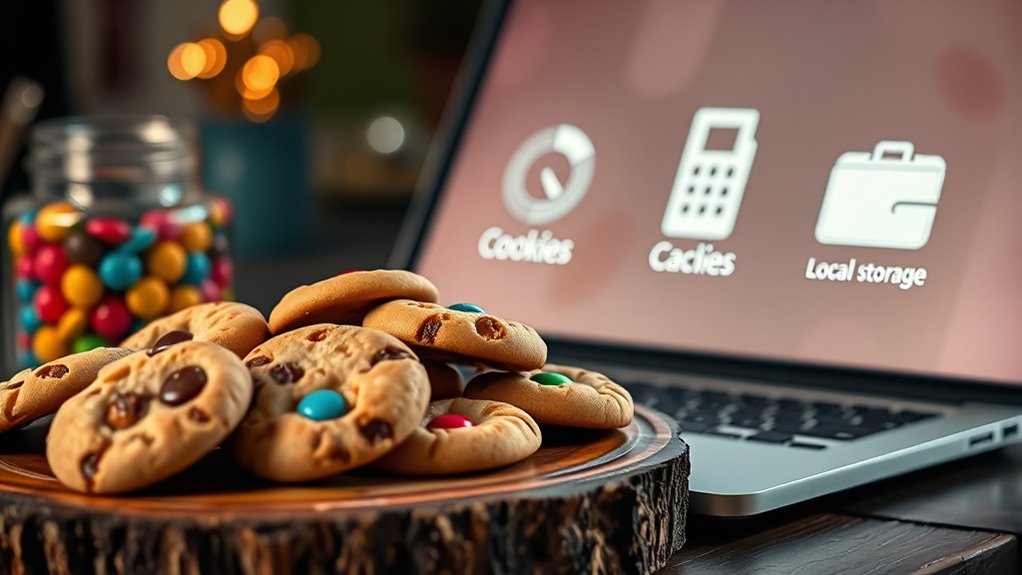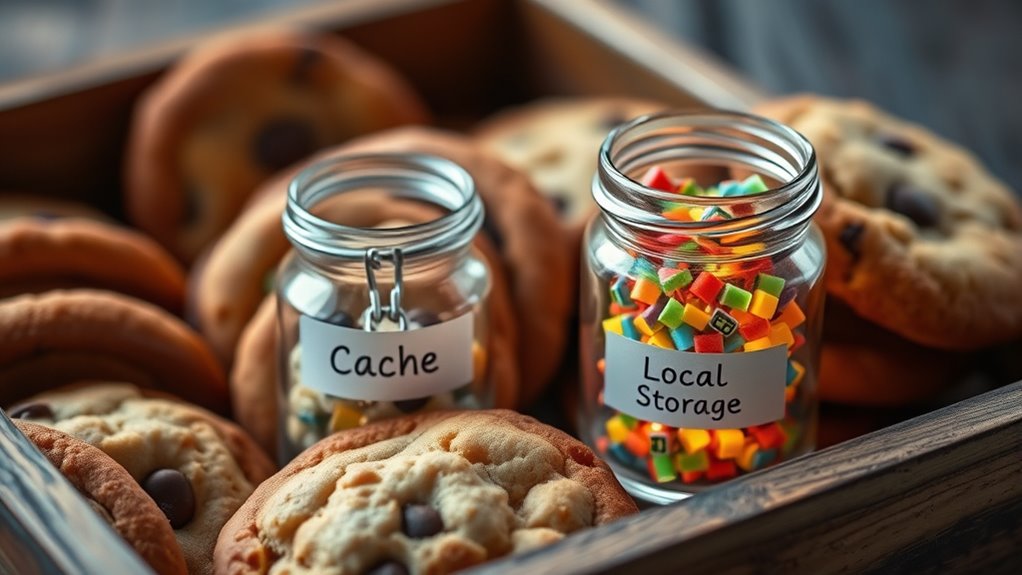Cookies, cache, and local storage are key tools in your browser that work together to improve your online experience. Cookies store small data files to keep you logged in, remember preferences, and track browsing. Cache speeds up loading times by saving copies of site elements, but might show outdated info if not cleared. Local storage holds larger data for apps and preferences, lasting longer. Continue exploring to discover how these tools protect your privacy and optimize browsing.
Key Takeaways
- Cookies store user data like preferences and login info to enhance browsing experience and enable tracking.
- Cache temporarily saves website elements to speed up loading times and reduce bandwidth usage.
- Local Storage holds larger, persistent data on devices for preferences, game saves, or app data beyond sessions.
- Cookies can be set to expire or stay until deleted, affecting privacy and data management.
- Clearing cache and cookies helps resolve outdated content issues and improves website performance.

Understanding how your browser stores information is key to both improving your online experience and maintaining your privacy. When you visit websites, your browser saves data to help manage your session and ensure a smoother, more personalized experience. This storage includes cookies, cache, and local storage, each serving different purposes but working together to enhance how you interact with the web.
Cookies are small text files that websites create on your device. They’re primarily used for session management—keeping you logged in, tracking your browsing behavior, or remembering your preferences. For example, when you add items to an online shopping cart, cookies help the site remember those choices as you navigate from page to page. They also contribute to data persistence, meaning they retain information across multiple sessions. This way, you don’t have to re-enter your login details or preferences every time you visit. Cookies can be set to expire after a certain period or remain until you delete them, giving you control over your privacy. They’re essential for customizing your experience but can also be used by advertisers to track your activities across different sites.
Cookies are small files that websites create to remember your preferences and keep you logged in.
Cache, on the other hand, is a storage layer designed to speed up your browsing. When you visit a website, your browser downloads various resources like images, scripts, and stylesheets. Instead of fetching these again each time you revisit, the cache stores copies locally. This reduces load times and conserves bandwidth, making your browsing faster and more efficient. However, cache can sometimes cause issues if outdated information is stored. Clearing your cache guarantees you see the most recent version of a website, especially after updates or changes.
Local storage is a more recent addition to your browser’s toolkit, designed for data persistence beyond what cookies offer. It allows websites to store larger amounts of data directly on your device, often without expiration dates. This is useful for storing user preferences, game progress, or other app data that needs to be retained over long periods. Unlike cookies, local storage isn’t automatically sent with every server request, which helps improve performance and privacy. However, because it can hold significant amounts of data, it also presents privacy concerns if sensitive information is stored insecurely. Additionally, storage management tools enable users to control and delete local data as needed.
Together, cookies, cache, and local storage make your browsing experience seamless but also introduce privacy considerations. Knowing how they work allows you to better control what information is stored and how it’s used, helping you strike a balance between convenience and privacy.

Smart Pen and Notebook - Smartpen Writing Set, Digital Smart pens for Note Taking, Real-time Sync for Digitizing, Storing, and Sharing Paper Notes, Compatible with ipad, iPhone and Android Smartphone
Smart Pen Real-Time Synchronization: The smart pen for note-taking allows for smooth writing at 360°, accurately capturing everything...
As an affiliate, we earn on qualifying purchases.
Frequently Asked Questions
How Do Cookies Impact Online Privacy?
Cookies impact your online privacy by enabling websites to track your browsing habits, which can lead to targeted advertising. They can also compromise your privacy if used for data collection without your consent. To protect yourself, look for tracking prevention tools and clear cookies regularly. While cookies often use data anonymization techniques, they still pose risks to your privacy, especially if third parties access sensitive information.
Can Cache Files Cause Website Loading Issues?
Imagine your cache files are a cluttered attic, overflowing with outdated or corrupted storage. When cache corruption or storage limits happen, your website loads painfully slow or even stalls completely. These issues cause loading errors, forcing you to clear the cache. By doing so, you remove the clutter, restore proper function, and make your browsing smooth again. Regularly clearing cache helps prevent these annoying loading problems.
How Secure Is Local Storage Against Hacking?
Local storage isn’t completely secure against hacking because data persistence makes it vulnerable, especially if you don’t use strong encryption methods. While it stores information locally in your browser, skilled hackers can exploit vulnerabilities or use malware to access this data. To improve security, always encrypt sensitive data before storing it locally and avoid saving confidential information in local storage whenever possible.
How Do I Clear Cookies, Cache, and Local Storage?
Think of your browser as a cluttered desk—you need to tidy it up. To clear cookies, cache, and local storage, go to your browser settings, find the privacy or security section, and select cookie management or cache clearing options. This action removes stored data, freeing up space and enhancing privacy. Regularly performing these steps keeps your browsing smooth and reduces security risks, just like decluttering helps your workspace.
Are There Differences in Data Storage Across Browsers?
Yes, data storage varies across browsers because of differences in browser compatibility and storage limits. Some browsers support more storage space, while others impose stricter limits. Additionally, certain browsers may implement unique security measures affecting how data is stored and accessed. You should check each browser’s specifications to understand its storage capabilities and limitations, especially if you’re developing web applications that rely heavily on local data storage.

Mloas Smart Sync Pen for Note Taking, Digital Notebook with Pen, Enables Synchronized Handwriting, Ocr to Text, Offline Storage, Audio Recording and Note Sharing, Compatible with IOS and Android
Your Dedicated Digital Notebook for Work & Ideas:This device works with a dedicated app to support your workflow....
As an affiliate, we earn on qualifying purchases.
Conclusion
Think of cookies, cache, and local storage as your website’s trusty toolkit—each playing a essential role in speeding up your browsing experience. They’re like a well-organized kitchen, keeping ingredients (data) handy so you don’t have to fetch them from scratch every time. By understanding how they work, you can better manage your online privacy and convenience. Mastering this toolkit means smoother, faster browsing—making your digital journey feel like gliding on a well-oiled bike.

Yuan Smart Digital Notebook with Pen, Smart Pen for Note Taking Real-Time Sync-to-Digital, Smart Writing for Meeting Class Creation, Digitizing, Store, and Share Handwritten Notes via App(iOS/Android)
【Important Note】 Before using the YUAN Smart Pen for the first time, fully charge it via USB. The...
As an affiliate, we earn on qualifying purchases.

Ophaya 2 in 1 Digital Pen Smart Pen Writing Set, Includes Smartpen, Notebook, Use with Ophaya App for Notes Taking, Recording, Storing
【2in1 Smartpen Writing Set】The Ophaya Smart Digital Notebook with Pen Set includes 1 digital smart pen, 1 dot-code...
As an affiliate, we earn on qualifying purchases.









